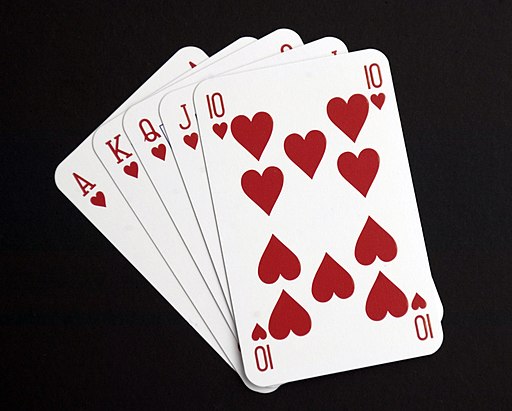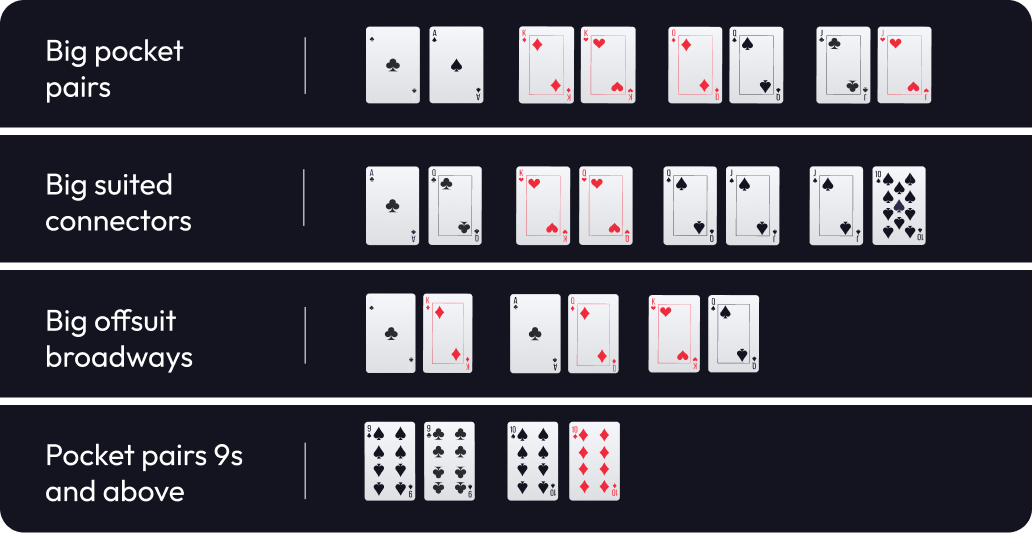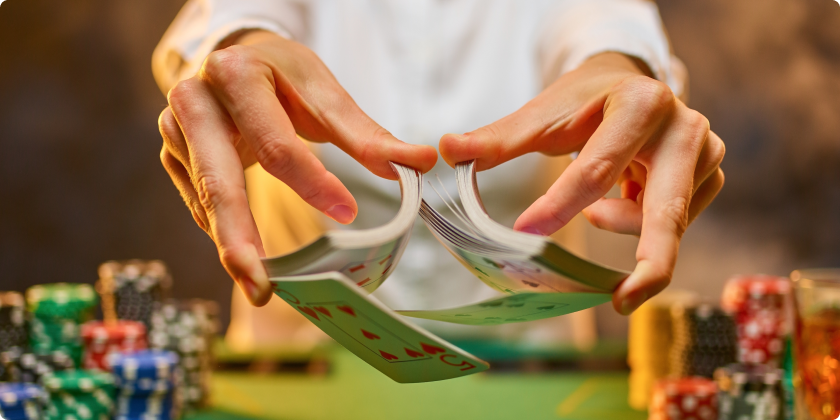Table of contents
Table of contents
Other Topics You May Like
8 Tips How To Win At Poker
Expert strategies and insider advice designed to sharpen your skills, enhance your poker mindset, and increase your chances of outsmarting the competition at the table

Want to start winning at the poker tables? Who doesn’t! Poker is a game of skill and psychology. Master both, and you can win serious prizes. We’ve prepared the key tips top players use to dominate the tables. Learn these fundamental poker secrets, up your game, and watch your chip stacks grow. Whether you’re a beginner or a seasoned pro, these 8 simple but effective tips will boost your win rate. Poker isn’t purely about luck – it’s about playing the odds and outwitting your opponents. With the right strategy, you can consistently beat the house. Ready to start winning at poker? Then read on!

How To Win At Poker Is To Keep Your Range Small
One of the biggest mistakes beginners make is playing too many garbage hands. They limp into pots with any two cards, hoping to miraculously flop a monster. This is a recipe for failure. Smart players only play premium hands, raking in chips when they connect with the board.
Tighten up your starting hand requirements, especially in early position. Only play the following hands:
- Big pocket pairs (AA, KK, QQ, JJ)
- Big suited connectors (AQs, KQs, QJs, JTs)
- Big offsuit broadways (AK, AQ, KQ)
- Pocket pairs 9s and above

Fold everything else pre-flop. Be selective and wait patiently for premium holdings. Then bet aggressively when you have a made hand. Playing fewer hands and focusing on quality over quantity is proven to boost win rates.
The key takeaway? Tighten up your hand selection if you want to start stacking more chips. Limit yourself to only the strongest starting hands, and you’ll win more pots at the poker tables.
Play A Balanced Range When Playing Poker
To consistently win at poker, you need to keep your opponents guessing. The key is balancing your range between strong hands and well-timed bluffs. Don’t fall into predictable patterns.
- Mix up your play style by incorporating more check-raises, overbets, and floating the flop. Make moves they won’t expect.
- Bet big when you have the nuts. Don’t be afraid to bluff and apply pressure with draws.
- Vary your bet sizing. Make large bets with strong hands and draws. Go smaller with your bluffs. Keep opponents off balance by being unpredictable.
- Stay unpredictable at the poker tables. If you want to maximize your win rate — balance your ranges, and keep your opponents guessing.
Winning poker requires carefully balancing aggression with deception. Don’t be a ‘calling station’. Put your opponents to tough decisions. When you balance your ranges properly, you’ll have them constantly guessing where they’re at in the hand.
Never Play Beyond Your Means When Managing Your Finances
One of the keys to winning at poker long-term is proper bankroll management. Don’t be tempted to play above your means. Set a poker budget and stick to it.
Only risk 1-5% of your total bankroll per session or tournament. This ensures you can absorb losses.
If you lose your entire buy-in, just walk away and reload another day when bankroll permits. Remember, variance happens in poker. Even the best players face downswings. Minimize stress by having a stop loss amount and stopping play when reaching it. Other tips include moving down limits if you lose multiple buy-ins and avoiding playing drunk or tilted. Your mental state impacts your ability to make optimal decisions.
Responsible bankroll management is vital for any successful poker career. Take a long-term outlook, play within your means, and manage tilt. This will keep you in action and progressing up the limits over time.

Recognize And Accept Defeat
In poker, learning to accept losses is just as important as celebrating wins. Every hand, even losses, offers a chance to improve your game. Adopt a growth mindset when analyzing defeats. Here are tips for learning from losing hands:
- Review your plays.
- Be objective.
- Study hand replays and use poker software.
- Discuss interesting hands with other players.
- Identify leaks in your game and work.
- Reflect on emotions and behavior.
- Focus on the process, not results.
- Don’t tilt when you had bad beated.
Staying positive and proactively learning from losing hands will improve your poker skills. Strive to make the best decisions you can with the information available. The more hands you play, the sharper you’ll become. Remember, even the best players lose 40-50% of hands. Accept defeats as part of the game, and stay hungry to improve. This is the path to poker mastery.
Avoid Becoming Too Drunk

When it comes to alcohol at the poker table, your approach depends on the game.
If you’re playing a casual home game or small stakes poker night with friends, having a few drinks can be fine. Relax and imbibe moderately, but try not to get fully drunk. You want to avoid embarrassment or major losses. Enjoy some drinks, but keep it reasonable. In a casual setting, 1-2 drinks over several hours is unlikely to severely impact your play. But be self-aware. If you feel yourself getting buzzed — take a break. And don’t play for serious money deeply drunk – you’ll likely regret those decisions later. The goal is to enhance the social experience, not impair your mental state.
If you play poker professionally or enter major tournaments, it’s wise to avoid drinking alcohol entirely during play. In high stakes, competitive games, your mental acuity directly impacts your win rate and bottom line. Even a slight alcohol buzz can lead to costly mistakes against tough opposition. Stay focused while long tournament or session by drinking water, tea or coffee. Take periodic breaks to clear your head. Eat snacks to maintain energy levels. Do everything you can to optimize decision-making over multiple hours or days of play. There is simply no upside to drinking when poker is your business and livelihood.
Talk To Other Players To Learn How To Play Poker And Win
Engaging with fellow poker players is one of the best ways to improve your game and strategy. Take advantage of their hard-won experience and lessons learned. Ways to tap into the wisdom of other players:
- Discuss interesting hands away from the tables, either in person or online. Exchange perspectives.
- Join poker forums and actively participate in strategy discussions. Bounce ideas off seasoned players.
- Read books written by professional poker players. See how they approach the game.
- Follow poker vlogs and podcasts to get inside the mind of pros.
- Arrange for coaching from a winning high stakes player. Customized advice can rapidly boost skills.
- Attend meetups and poker networking events. Make connections with serious players.
The best players are always learning – from both wins and losses. Network with serious-minded poker enthusiasts to workshop strategy. Compare tourney experiences and discuss ways to improve. You’ll return to the tables armed with new ideas to test. Surround yourself with smart poker minds. Absorb their wisdom and make it part of your game. There’s no faster way to master poker than learning from those who’ve been in the trenches before.
Get Willing To Get Bluffed
Accepting that you will sometimes get bluffed is an inevitable part of poker. Don’t take it personally or let it tilt you. Skilled opponents will bluff you at times no matter how strong your play. Expect bluffs to happen and be prepared to minimize their impact. When an aggressive player represents strength, don’t be afraid to fold or call. But don’t overfold/overcall either – that will be exploited.
Analyze your reaction after getting bluffed. Did it put you on tilt and disrupt your mental game? Work on controlling emotions and moving on to the next hand with a fresh perspective. Also review the hand itself. Look for any reads you might have missed or ways to more accurately narrow opponents range. Think about sizing tells that may indicate the strength of their hand. Reflect on any errors in your line that made you susceptible to getting bluffed.

Accepting bluffs feels not really pleasant, but you can reduce their frequency. Select your table and seat position wisely. Identify loose aggressive players and only play with great hands against them. But don’t be predictable either – keep them guessing with mixed play, as we said in our guide earlier. While no one enjoys getting bluffed, the top players learn from these moments. They add new data points to opponents profiles. They gain insights on how to better disguise the strength of their own hands. Take the right lessons, and getting bluffed occasionally can actually improve your poker skills.
Pass The Ego At The Door
One of the fastest ways to sabotage and ruin your poker success is having an overinflated ego. Skilled players stay humble, coachable and focused on improvement. Here are tips for keeping your ego in check:
- Be willing to admit mistakes and learn from losses.
- Don’t justify errors to protect your ego.
- Avoid trash talking, taunting opponents or celebrating prematurely.
- Don’t underestimate opponents or assume you’re the best at the table.
- Study training content and books even after you gain experience.
- Compliment opponents when they make good plays.
- Don’t complain about bad beats.
Ego is the enemy of growth and adaptation in poker. The game has a way of humbling even the most skilled players. Stay hungry, take ownership of mistakes, and keep your mind open and cool. Progress over perfection. This mindset builds true poker mastery over time. Check your ego at the door. Stay humble, reflective and focused on improvement, and you’ll enhance your win rate. No one knows it all in poker – keep working on your game.
Tips Summary
Mastering poker requires skill, strategy, and a focused mindset. Implement these 8 fundamental tips discussed to start winning more hands. Tighten your preflop range, balance aggression with deception, and manage your bankroll responsibly. Learn from defeats through review and discussion. Stay mentally sharp by avoiding intoxication. Absorb wisdom from veteran players and keep ego aside. Expect to get bluffed sometimes — accept it and adapt. Poker mastery is an ongoing journey – stay humble and keep learning.
Apply these essential tips at the tables to make optimal plays. Keep practice, analyze and calculate risks — and your chip stacks will steadily grow. Stay strategic, unemotional, and dedicated to improve, and you can develop the skills to consistently win at this complex yet rewarding game of poker.
Understood basics, learnt tips and ready to practice? Gambillion offers you best offers to play poker online with huge bankroll bonuses and most exciting tables! No bluffs, pure value only for Gambillion users.

















